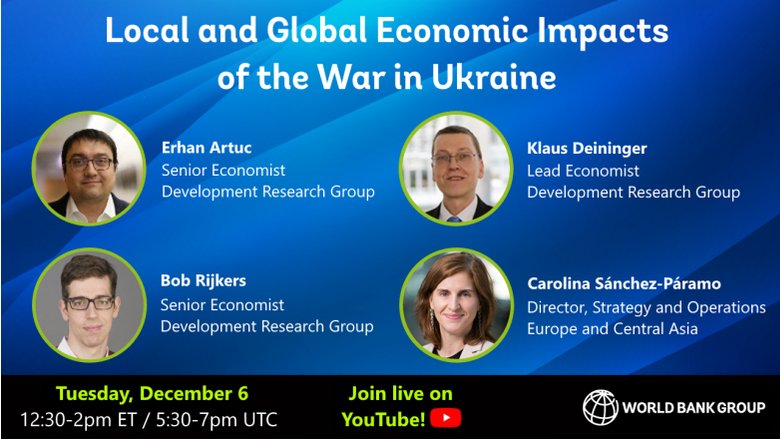Presentations
- (Artuc)
- (Deininger)
- (Rijkers)
Additional Resources
- (Working Paper)
- (Working Paper)
- (VoxEU Column)
- Household Impacts of Tariffs (HIT) Tool

��In war, truth is the first casualty.��
- Aeschylus
The Russian invasion of Ukraine has had far-reaching consequences for human wellbeing, first and foremost for the citizens of Ukraine, but also for the world at large. Quantifying the costs of war is a challenging undertaking, given the lack of reliable data as well as the difficulty of capturing the complex welfare effects of war with typical indicators like GDP.
In this Policy Research Talk, three World Bank researchers��Erhan Artuc, Klaus Deininger, and Bob Rijkers��will rely on inventive methods and sources of data to paint a more complete picture of the appalling costs of war. Patterns of migration outflows from the Donbas region will allow for a more complete assessment of the burden of war that falls on the shoulders of citizens caught in its wake. A combination of satellite and household survey data will be used to document the war��s impact on agricultural production and the welfare of the rural population and to illustrate how these insights are being used by government agencies to provide targeted just-in-time support in a fully transparent and digital way. Finally, an analysis using the HIT toolkit will reveal the broader impact of the war on food prices around the world, especially as they affect poor households. Together, these innovative approaches to measuring the cost of war offer a more accurate analysis to inform local and international responses to the conflict.
The monthly Policy Research Talks showcase the latest findings of the World Bank��s research department, challenge and contribute to the institution��s intellectual climate, and re-examine conventional wisdom in current development theories and practice. These talks facilitate a dialogue between researchers and operational staff and inform World Bank operations both globally and within partner countries. Read More ?